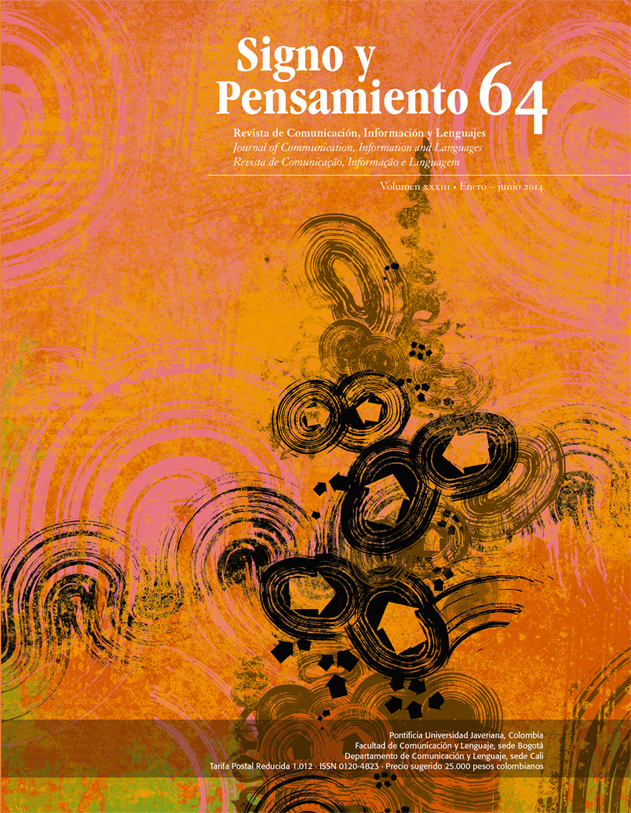Abstract
Based on a critical discourse analysis, the theory of social mediation and political economy of communication, the theoretical foundations, methodological route and the main findings of a doctoral research work are described in this article. The objective is to analyze the conceptual and referential map with which a concept is being developed and has appeared in recent years to define a broader phenomenon, yet ambiguous, such as the digital divide; which is also part of discursive threads related to the inclusion of ICT, Information and Communication Technologies. The identification of the linguistic set of structures found in the discourses analyzed has been focused on the recognition of systems of knowledge that can be seen in the various expressions about social phenomena.
Fairclough, N. (1995). Media Discourse. England: Arnold Ed.
Felicie, A. (2006). Biblioteca pública, sociedad de la información y brecha digital. Buenos Aires: Alfagrama Ediciones.
Gore, A. (1993). Technology for America’s Economic Growth, A New Direction to Build Economic Strength. Vice President Albert Gore, Jr. Recuperado de http://www.mcreporter.info/ documenti/technology.pdf
Hernández, E. (2008, noviembre). Hacia las comunidades de conocimientos. En XIII Congreso Internacional del CLAD sobre la Reforma del Estado y de la Administración Pública, Buenos Aires, Argentina.
Marí, V y Sierra, F. (2008, enero). Capital Informacional y apropiación social de las nuevas tecnologías. Las redes críticas de empoderamiento local en la Sociedad Europea de la Información. Revista Telos. Recuperado de http://sociedadinformacion.fundacion. telefonica.com/telos/articulodocumento.asp@ idarticulo=2&rev=74.htm
Martín Serrano, M. (2004). La producción social de la comunicación. Ediciones 1 y 3. Madrid: Alianza Editorial.
Martín Serrano, M., Piñuel, J. L, Gracia, J. y Arias, M. (1982). Teoría de la comunicación. I: Epistemología y análisis de la referencia. Madrid: Corazón Editor.
Mattelart, A, Mattelart, M. y Multigner, G. (1988). Pensar sobre los medios. Comunicación y crítica social. San José de Costa Rica: Editorial Departamento Ecuménico de Investigaciones DEI.
Pardo, N. (2007). Cómo hacer análisis crítico del discurso. Una perspectiva latinoamericana. Chile: Editorial Frasis.
UNESCO. (2005).Hacia las sociedades del conocimiento. Informe Mundial de la UNESCO.
UIT (Unión Internacional de Telecomunicaciones). (2003). Declaración de Principios. Cumbre mundial sobre la sociedad de la Información. Recuperado de http://www.itu.int/ wsis/index-es.html
UIT (Unión Internacional de Telecomunicaciones).(2005). Agenda de Túnez para la sociedad de la información- Cumbre Mundial para la sociedad de la Información. Recuperado de http://www.itu.int/wsis/indexes.html
UIT (Unión Internacional de Telecomunicaciones).(2007). World Information Society Report 2007.
UNRISD. (2003). Análisis de los avances informacionales: Reflexiones sobre temas esenciales de investigación. Recuperado de http://www.unrisd.org/80256B3C005BCCF9/(httpPubli cations)/659F70CF50ED1D72C125714E004 B9DEF?OpenDocument
Van Dijk, J. (2005). The deepening divide. Inequality in the Information Society.London: Sage Publications.
Van Dijk, T. (1990). La noticia como discurso: comprensión, estructura y producción de la información. España: Paidós Comunicación
Van Dijk, T. (2000). El discurso como estructura y proceso. Barcelona: Editorial Gedisa.
Vega-Almeida, R. (2007, abril). Brecha digital: un problema multidimensional de la sociedad emergente. Revista Inclusão Social, (2), 96-108.
This journal is registered under a Creative Commons Attribution 4.0 International Public License. Thus, this work may be reproduced, distributed, and publicly shared in digital format, as long as the names of the authors and Pontificia Universidad Javeriana are acknowledged. Others are allowed to quote, adapt, transform, auto-archive, republish, and create based on this material, for any purpose (even commercial ones), provided the authorship is duly acknowledged, a link to the original work is provided, and it is specified if changes have been made. Pontificia Universidad Javeriana does not hold the rights of published works and the authors are solely responsible for the contents of their works; they keep the moral, intellectual, privacy, and publicity rights.
Approving the intervention of the work (review, copy-editing, translation, layout) and the following outreach, are granted through an use license and not through an assignment of rights. This means the journal and Pontificia Universidad Javeriana cannot be held responsible for any ethical malpractice by the authors. As a consequence of the protection granted by the use license, the journal is not required to publish recantations or modify information already published, unless the errata stems from the editorial management process. Publishing contents in this journal does not generate royalties for contributors.


